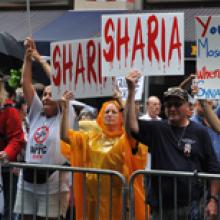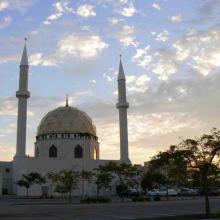Islam
Last Saturday Muslims throughout the world celebrated Laylat ul-Qadr, usually translated in English as the Night of Power. It is part of the month of Ramadan and commemorates the night when Allah came to Muhammad with the first revelation of the Qur’an. The Night of Power is based on chapter 97 of Islam’s Holy Book. The Qur’an has 114 chapters, which are generally ordered from longest to shortest. So, chapter 97 is short enough to quote in full here:
In the name of God, the Lord of Mercy, the Giver of Mercy,
We sent it down on the Night of Power. What will explain to you what the Night of Power is? The Night of Power is better than a thousand months; on that night the angels and the Spirit descend again and again with their Lord’s permission on every task; [there is] peace that night until the break of dawn.
In message published on Friday, Pope Francis took the rare step of personally expressing his “esteem and friendship” to the world’s Muslims as they prepare to celebrate the end of the Ramadan fast.
While it is a long-established Vatican practice to send messages to the world’s religious leaders on their major holy days, those greetings are usually signed by the Vatican’s department for interfaith dialogue.
In his message, Francis explains that in the first year of his papacy he wanted to personally greet Muslims, “especially those who are religious leaders.”
Francis’ predecessor, Pope Benedict XVI, had fraught relations with Muslims. In a 2006 speech he quoted a Byzantine emperor who said Muhammad had only brought “evil and inhuman” things to the world, sparking a worldwide crisis in Christian-Muslim relations.
NASHVILLE, Tenn. — For the third time, Jesus is about to change Reza Aslan’s life.
As a teenager, Aslan turned to Jesus in an evangelical youth group, where becoming a Christian made him feel like a real American.
He later studied Jesus of Nazareth in college, which led Aslan to a doctorate in the sociology of religion.
Now Aslan’s controversial new book about Jesus is about to make him a best-selling author. Zealot: The Life and Times of Jesus of Nazareth has already reached No. 1 on Amazon.com. It’s expected to debut this weekend on The New York Times’ best-seller list, becoming the latest in a long line of controversial and profitable books about the so-called historical Jesus.
Aslan said he wants to show the power of Jesus as a flesh-and-blood human being, rather than the savior of the world. That Jesus has gotten lost in 2,000 years of church history, he said.
"And God spoke all of these words…You shall not give false witness against your neighbor." Exodus 20:1, 16
Several months back I overheard a conversation in an office waiting room. A young, 20-something guy entered the waiting room with his board shorts on and his windblown hair haphazardly tucked beneath his backwards baseball cap as though he’d just come in from surfing – not uncommon in the beach community of Jacksonville, Fla. He strolled confidently to the receptionist and asked her a question about the availability of a person he wanted to see, made an appointment, and it seemed his business was done and he’d be on his way. Instead he asked the receptionist where she was from, if she liked her job, and then talked about the weather. He then began to tell her about a Bible study he was leading and a little about his faith journey – for the longest time he felt lost, was starting to get in trouble, then he found Jesus, was born again, and began to set his life straight.
After sharing his testimony he asked the receptionist, “What religion are you?"
Last night, my wife Janny and I had the honor of sharing a table with a gathering of local Muslims for an Iftar meal. It is currently Ramadan, which means the Muslim community around the globe fasts everyday day from sunrise to sunset. No food. No water. No tobacco. No sex. Each night they have a celebration feast to break their daily fast called the Iftar meal. It is sacred, joyous, and a time to sit with those they love to worship the One they love, Allah (which is simply the Arabic translation of God).
It was into that sacred gathering that they expanded the table and pulled up a seat for us and a few other Christian and political leaders throughout San Diego. Their hope was simply to create space in their daily practice for their neighbors to experience life with them. They were both acknowledging city leaders who have been proactive in creating an environment of dignity and mutual relationship, and creating a space for new/renewed understanding of one another. Acknowledging our core faith differences, they made clear that it should in no way detract from our ability to share a common vision for the good of our city. We are neighbors who live, work, and play on the same streets with a common desire to see deep, charitable relationships, sustainable economy, and mutual understanding and a celebration of diversity.
As I often say, as followers of Jesus, we have no choice but to move toward relationships with those who are marginalized, dehumanized, and in need of love. We don’t compromise our faith by hanging out with people we may or may not agree with. No, in fact, we reflect the very best of our faith.
North Carolina lawmakers on Wednesday approved a bill to prohibit judges from considering “foreign laws” in their decisions, but nearly everyone agrees that “foreign laws” really means Shariah, or Islamic law.
North Carolina now joins six other states — Oklahoma, Arizona, Kansas, Louisiana, South Dakota, and Tennessee — to pass a “foreign laws” bill. A similar bill passed in Missouri, but Gov. Jay Nixon vetoed it, citing threats to international adoptions.
The bills all cite “foreign laws” because two federal courts have ruled that singling out Shariah — as Oklahoma voters originally did in 2010 — is unconstitutional.
SALT LAKE CITY — Every day. For a month. From sunup to sundown. No food. No water.
No sweat?
No, plenty of sweat, especially this year.
With Utahns baking under energy-sapping, forehead-dripping, water-chugging temperatures, the state’s Muslims are swearing off that liquid life force during the heat of the day — and the morning, and the evening.
The annual 30-day fast known as Ramadan, one of Islam’s five pillars, began Tuesday and requires that believers forgo food and drink. At this time of year, that means 15 hours of parched throats and unquenched thirst.
We all know that when it comes to the acceptance of LGBT folks, religions differ. But what the religions communicate, and how the people in the pews actually feel, are not the same.
In a word, the rank and file tend to be more accepting than the leadership. What’s striking is how much this LGBT Gap varies from religion to religion, and we can get some idea of the variance from Pew’s new survey of LGBT Americans.
As the measure of institutional messaging, we will use the percentages of LGBT people who say a given religion is unfriendly to them. These range from 84, 83, 79, and 73 percent for Islam, Mormonism, Catholicism, and Evangelicalism to 47 and 44 percent for Judaism and Mainline Protestantism. Then there is the proportion of members of each religion who believe that “homosexuality should be discouraged by society.” That’s 45, 65, 20, and 59 percent for the first four groups; 15 and 26 percent for the last two.
Amid calls to get more Muslims using the Internet, experts who have studied Muslims online caution that the virtual Islamic community can be a “double-edged sword.”
While the proliferation of Muslim websites provides a platform for a multitude of voices, Sahar Khamis, communication professor at the University of Maryland, College Park, said there is a shortage in the amount of rational, critical deliberation, and debate taking place online.
The Pew Forum on Religion & Public Life recently released a report suggesting that Muslims who use the Internet tend to have a more favorable view of Western movies, music, and television than their offline counterparts.
Missouri Gov. Jay Nixon has vetoed a bill that would have made his state the seventh in the nation to prohibit judges from considering Shariah, or Islamic law, and other “foreign laws” in their decisions.
But rather than citing the usual arguments about anti-Muslim discrimination and the freedom of religion, Nixon introduced a new argument against such legislation, asserting it would make it harder for Missouri families to adopt children from overseas.
Nixon said if state judges would not be able to consider foreign decrees that are sometimes required to finalize adoptions, adoptive families and children would be left stranded.
Muslims in America are much less inclined to support suicide bombing than other Muslims abroad, and are more likely to believe that people of other faiths can attain eternal life in heaven, according to a new report released Tuesday by the Pew Forum on Religion & Public Life.
“The World’s Muslims” report looks at Muslim views across seven categories: Islamic law; religion and politics; morality; women; relations among Muslims; interfaith relations; and religion, science, and pop culture. There is also a special section on U.S. Muslims.
Of the countries surveyed, only a majority of Muslims in America — 56 percent — believe people of other faiths can go to heaven; by contrast, that figure among U.S. Christians is about 64 percent. U.S. Muslims are also less likely than Muslims abroad to believe in evolution, sharing views that are closer to those of U.S. Christians.
On suicide bombing, 81 percent of U.S. Muslims said it was never justified, 7 percent said it was justified to “defend Islam,” and 1 percent said it was “sometimes justified.”
When Karen Hunt Ahmed and her Muslim husband divorced four years ago, many friends asked her, “Now you can stop this Islam stuff, right?”
Some friends, she thought.
“Like it was a hobby I took up when I got married and now I’m supposed to drop it,” said Hunt Ahmed, president of the Chicago Islamic Microfinance Project, which she founded with two colleagues in 2009.
Hunt Ahmed, 45, is part of a growing sorority of female American converts to Islam, especially those who are or were married to Muslim men, who must deal with the perception that they converted to Islam because of domineering boyfriends or husbands.
The stereotype was revived in the wake of the Boston Marathon bombings, when news emerged that the wife of bombing suspect Tamerlan Tsarnaev, Katherine Russell, converted to Islam after meeting Tsarnaev in 2009 or 2010 when she was about 21.
An international consortium of nonbelievers is planning rallies Thursday outside Bangladeshi embassies and consulates to demand the release of several Bangladeshi bloggers who were arrested on charges of blasphemy.
The rallies are in support of four Bangladeshi men arrested earlier this month for “hurting religious sentiments,” a crime tied to an 1860 law that can carry up to 10 years in jail.
The four men — all bloggers — staged a sit-in at a public square demanding a ban on the country’s largest Islamic political party; Islam is the official state religion in Bangladesh.
CAMBRIDGE, Mass. — After two troubling outbursts at a local mosque, leaders there told Boston Marathon bombing suspect Tamerlan Tsarnaev he would no longer be welcome if he continued disrupting services.
Leaders at the Islamic Society of Boston‘s mosque in Cambridge say Tsarnaev, 26, who died early Friday after a shootout with police, “disagreed with the moderate American-Islamic theology” of the mosque, but they never had “any hint” the brothers might be violent.
On one occasion in November at weekly prayer, Tsarnaev challenged an imam who said in his sermon that it was appropriate to celebrate U.S. national holidays, such as July 4th and Thanksgiving, the statement said.
Tsarnaev argued that such celebrations are “not allowed in the faith.” When the preacher met with Tsarnaev after the prayer, Tsarnaev “repeatedly argued his viewpoint, and then left,” the statement said.
American Muslim leaders said they stand against terrorism committed in the name of Islam, trying to distance themselves from the suspects in the Boston Marathon bombings who were identified as Muslims with ties to Chechnya.
“We will never allow ourselves to be hijacked by this attempt, and we will not allow the perception to be that there is any religion in the world that condones the taking of innocent life,” said Nihad Awad, national executive director of the Council on American-Islamic Relations.
As the manhunt intensified in and around Boston, Muslim leaders convened a press conference Friday to denounce the attacks and to urge the media not to link their faith with violent extremism.
Lego is defending its “Star Wars”-based Jabba the Hutt toy set after a Turkish cultural group said it promulgates negative stereotypes of Muslims.
Earlier this year, the Turkish Cultural Community of Austria criticized the Danish toy company, saying the Jabba’s Palace set was insensitive because of its similarity to Muslim mosques.
“The terrorist Jabba the Hutt likes to smoke a hookah and have his victims killed,” said the statement, reported by the Austrian Times. “It is clear that the ugly figure of Jabba and the whole scene smacks of racial prejudice and vulgar insinuations against Asians and Orientals as people with deceitful and criminal personalities.” Earlier this year, the Turkish Cultural Community of Austria criticized the Danish toy company, saying the Jabba’s Palace set was insensitive because of its similarity to Muslim mosques.
A federal judge on Thursday denied an Indiana man’s request to withdraw his guilty plea in an arson blaze last September at a Toledo-area mosque.
The judge confirmed a sentencing date of April 16 for Linn, who was charged with intentionally defacing, damaging, and destroying religious property; using a fire to commit a felony; and using and carrying a firearm to commit a crime of violence. Judge Jack Zouhary of U.S. District Court in Toledo said Randolph Linn, 52, of St. Joe, Ind., was fully competent on Dec. 19 when he pleaded guilty to federal charges related to the Sept. 30 fire at the Islamic Center of Greater Toledo.
Linn, who did not testify at the hearing, had filed a motion seeking to withdraw his guilty plea, saying he had signed the plea under duress and that he “did not have the opportunity to discuss defenses, tactics, strategies, or the nature and effect of my guilty plea and sentencing.”
VATICAN CITY — Pope Francis on Friday called for more intense dialogue between religious leaders, particularly Muslims, as he tries to recalibrate relations between the world’s two largest religious groups.
Speaking in the Vatican’s majestic Sala Regia, the Argentine pontiff said that part of his mission is to connect “all people, in such a way that everyone can see in the other not an enemy, not a rival, but a brother or sister.”
In a meeting with Vatican diplomats and foreign leaders, Francis also reaffirmed the church’s commitment to protect the poor and the environment, an early theme in his young pontificate.
“Fighting poverty, both material and spiritual, building peace and constructing bridges: these, as it were, are the reference points for a journey that I want to invite each of the countries here represented to take up,” the pope said.
Muslim and civil rights organizations say a New York Police Department program to secretly monitor Islamic communities has created so much fear and suspicion among Muslims that many find it impossible to lead normal lives.
A new 56-page report, “Mapping Muslims: NYPD Spying and its Impact on American Muslims,” details how the NYPD’s covert surveillance caused Muslims to refrain from activism and change their appearance so as not to appear too Muslim, and sowed suspicion among community members.
As a result, the Monday report asserts, trust between Muslims and police has broken down. The program, in which NYPD policemen secretly visited mosques, Muslim-owned businesses, and student and civic associations beyond New York’s five boroughs, was established in 2001 but uncovered by The Associated Press in 2011.
A spokesperson for the NYPD did not respond to a request for comment.
I read a lot of Trinitarian theology last semester at Duke Divinity school, most of it trying to discern how believing in a Triune God might affect the way people of different religious faiths relate to one another. The other great Monotheisms, Islam and Judaism, of course reject the Trinity as they reject Jesus as divine. But what if the Christian belief in the Triune God is the very basis on which Christians can accept Jews as Jews, Muslims as Muslims, and atheists as atheists? Different theologians have explored how the Trinity might be a good place to ground a Christian theory of religious pluralism. S. Mark Heim has gone so far as to say that God’s own inner diversity shows God’s intention for a diverse humanity, even including religious diversity. In other words: People might believe in a non-Trinitarian God because they were made by a Trinitarian God. Mind-blowing.
I wasn’t expecting to find resonance in Charles Darwin, whose name has been used in so much anti-religious fervor. But in his 1857 letter to Asa Gray, Darwin wrote about the “principle of divergence” and how “the same spot will support more life if occupied by very diverse forms.” We might not want to make a precise analogy to human society when Darwin concludes that “each new variety or species, when formed will generally take the place of and so exterminate its less well-fitted parent.”
That line of thinking could easily lead us to euthanasia. But, taken with his observation that diversity fosters life, we might say that co-existence with others forces a species to adapt, and everyone is better for it. Consider the converse of Darwin’s statement: The same spot will support less life if occupied by a unitary form. There is something life-giving – Heim might say “divine” – about difference.















